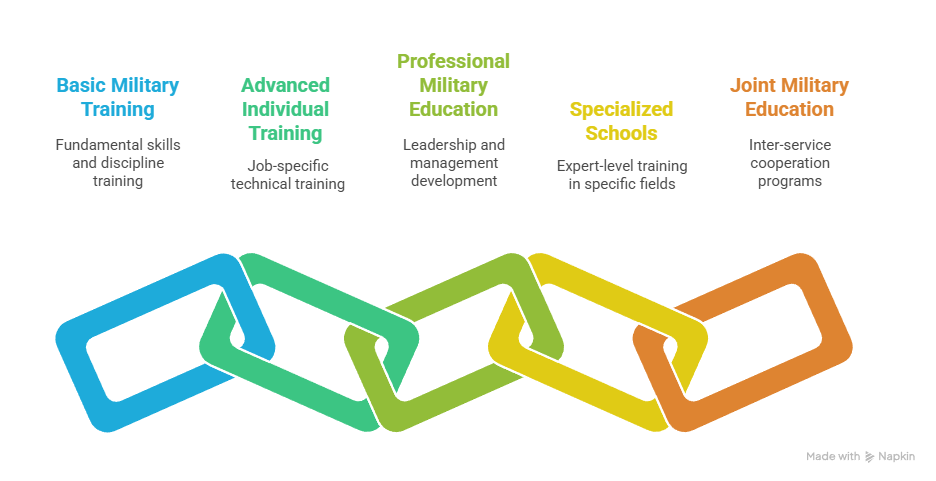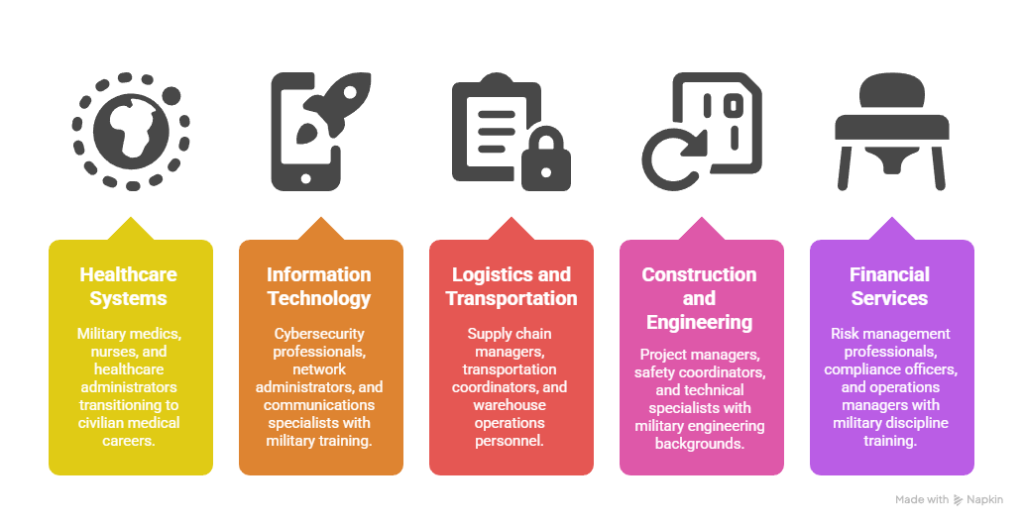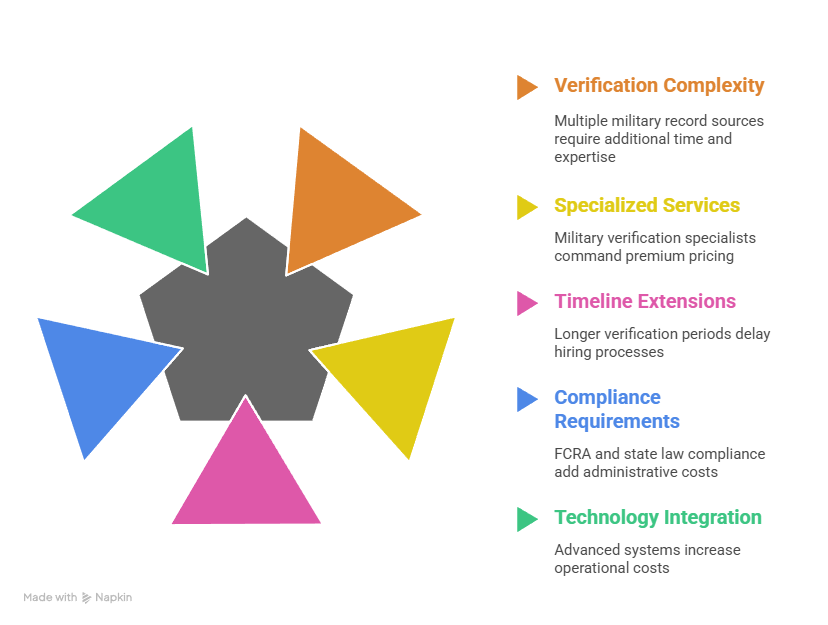Military education background checks verify service members' formal military training, civilian education pursued during service, and professional credentials earned through military programs. These comprehensive screenings ensure accurate representation of veteran qualifications while helping employers validate military-acquired skills and educational achievements.
Key Takeaways
- Military transcript verification includes both formal military education (service academies, military colleges) and civilian education completed during active duty service.
- DD-214 background checks provide comprehensive military service verification, including deployment history, specializations, and educational accomplishments during service.
- Veteran employment screening typically combines traditional background checks with specialized military service verification to ensure complete candidate assessment.
- Military education verification covers technical training, leadership development programs, and professional certifications earned through military channels.
- Employers benefit from understanding military education equivalencies and how they translate to civilian workplace skills and qualifications.
- Legal compliance requires following FCRA guidelines and state-specific employment laws when conducting military education background checks.
Understanding Military Education Background Checks
Military education background checks verify educational achievements earned during military service. These screenings examine both formal degree programs and technical training completed throughout military careers. The process differs significantly from civilian education verification due to unique military educational systems.
Employers must understand that military education spans multiple categories and institutions. Service members often attend civilian colleges while on active duty. They also complete extensive technical training at military facilities. Professional development programs add another layer of educational credentials that require verification.
The verification process involves reviewing military transcripts and service records. Educational documentation comes from both military and civilian sources. Professional screening companies with military expertise can navigate these complex systems effectively. They ensure compliance with federal regulations while providing accurate verification results.
Components of Military Service Verification
DD-214 Documentation Review
The DD-214 form contains essential information about military service and education. This official document records formal education completed before, during, and after military service. Military occupation specialties and technical training completion are documented within this comprehensive record.
| DD-214 Section | Educational Information | Verification Value |
| Block 11 (Military Education) | Formal military schools attended | Direct verification of specialized training |
| Block 12 (Civilian Education) | College degrees and certifications | Academic achievement validation |
DD-214 verification requires understanding military codes and abbreviations. Professional background check services interpret these documents accurately for employers.
Military Transcript Systems
Each military branch maintains detailed educational records through specialized systems. The Army uses ATRRS (Army Training Requirements and Resources System) for tracking training records. Navy and Marine Corps personnel records are maintained through NETC (Naval Education and Training Command). Air Force and Space Force members have records in AFCOOL (Air Force Credentialing Opportunities On-Line).
These systems track all educational activities completed during military service. Technical training, leadership courses, and civilian education are all documented. Professional certifications earned through military programs are also recorded in these comprehensive databases.
Service Academy and Military College Records
Service academies provide formal college education equivalent to civilian universities. The United States Military Academy, Naval Academy, Air Force Academy, Coast Guard Academy, and Merchant Marine Academy maintain traditional academic transcripts. Military colleges and war colleges offer advanced degree programs for senior military personnel.
These institutions follow standard academic verification processes similar to civilian colleges. Transcripts are available through traditional educational verification channels. However, some specialized programs may require additional military-specific verification procedures.
Types of Military Educational Credentials
Military personnel accumulate diverse educational credentials throughout their service careers. Technical certifications form the foundation of military job training programs. Leadership development courses prepare service members for advancement and management responsibilities. Specialized schools provide expertise in specific military occupational fields.
Core Military Education Categories:

- Basic Military Training: Fundamental military skills and discipline training required for all service members
- Advanced Individual Training: Job-specific technical training for military occupational specialties
- Professional Military Education: Leadership and management development for career advancement
- Specialized Schools: Expert-level training in specific fields like aviation, intelligence, or communications
- Joint Military Education: Inter-service training programs promoting cooperation between military branches
Combat training and deployment-related education add practical experience components. Many military programs carry civilian accreditation or equivalent credentials. Professional organizations often recognize military training for certification purposes. Understanding these educational pathways helps employers assess veteran qualifications accurately.
Popular Industries for Military Education Screening
Government contractors and defense industry companies conduct the most comprehensive military education verification. These organizations require detailed security clearance verification combined with educational background checks. Federal agencies hiring veterans need thorough verification of military training and civilian education credentials.
Aviation and aerospace industries heavily recruit military personnel with specialized technical training. Commercial airlines seek former military pilots with verified flight training and educational credentials. Aircraft maintenance companies value military aviation technicians with documented training verification. Aerospace manufacturers require engineers and technicians with verified military education backgrounds.
High-Priority Industry Sectors:

- Healthcare Systems: Military medics, nurses, and healthcare administrators transitioning to civilian medical careers
- Information Technology: Cybersecurity professionals, network administrators, and communications specialists with military training
- Logistics and Transportation: Supply chain managers, transportation coordinators, and warehouse operations personnel
- Construction and Engineering: Project managers, safety coordinators, and technical specialists with military engineering backgrounds
- Financial Services: Risk management professionals, compliance officers, and operations managers with military discipline training
Energy sector companies frequently hire veterans for technical and management positions. Oil and gas companies value military logistics and engineering training for field operations. Utility companies seek veterans with electrical and mechanical training for infrastructure maintenance. Renewable energy companies recruit military personnel with technical education and project management experience.
Technology Sector Military Recruitment
Technology companies increasingly recognize the value of military cybersecurity and communications training. Silicon Valley firms actively recruit veterans with information technology and cybersecurity credentials. Government technology contractors require extensive military education verification for security clearance positions.
Software development companies value military training in systems analysis and project management. Cloud computing providers seek veterans with network administration and security training backgrounds. Telecommunications companies recruit military communications specialists with verified technical training credentials.
Manufacturing and Industrial Applications
Manufacturing companies prioritize veterans with technical training and leadership development experience. Automotive manufacturers seek military personnel with mechanical and electrical training backgrounds. Chemical companies value military safety training and hazardous materials handling credentials.
Industrial equipment manufacturers recruit veterans with maintenance and repair training experience. Construction companies seek military personnel with project management and heavy equipment operation credentials. Quality control and inspection roles often require verified military training in technical specialties.
Veteran Employment Screening Best Practices
Successful veteran employment screening requires understanding military culture and educational systems. Employers must recognize that military education combines theoretical knowledge with extensive practical application. This hands-on experience often exceeds civilian educational requirements in depth and intensity.
Military-friendly verification approaches respect veterans' service while ensuring thorough candidate evaluation. These processes recognize military education equivalencies and understand how training translates to civilian job requirements. Building relationships with military-experienced screening providers enhances verification effectiveness. Professional services specializing in military records understand proper channels for accessing educational documentation.
Military-Friendly Screening Elements:
- Cultural Competency: Understanding military terminology, rank structures, and service traditions
- Equivalency Knowledge: Translating military training to civilian job requirements and qualifications
- Expedited Processing: Streamlined verification procedures that respect veterans' job search timelines
- Comprehensive Coverage: Including all forms of military education from basic training to advanced degrees
Legal Compliance Requirements
Military education background checks must comply with Fair Credit Reporting Act (FCRA) regulations. State-specific employment laws add additional requirements for comprehensive veteran screenings. California employers face requirements under the Investigative Consumer Reporting Agencies Act (ICRAA). These regulations protect veteran job seekers while ensuring employers receive accurate information.
Written authorization must be obtained before conducting military education verification. Adverse action procedures must be followed if discrepancies affect hiring decisions. Record retention requirements apply to all verification documents and results. Privacy protection is essential for handling sensitive military service information.
Common Military Education Verification Challenges
Military education verification presents unique obstacles due to complex educational systems and record-keeping practices. Service members may have attended multiple institutions during their military careers. Training may have occurred at various military facilities with different record-keeping systems. Credentials may come from programs that have changed names or been discontinued.
Primary Verification Obstacles:
- Record Accessibility: Some military training records have restricted civilian access due to security classifications
- Institution Changes: Military schools may have closed, merged, or transferred to different military commands
- Documentation Gaps: Incomplete records due to operational deployments, emergency training, or combat situations
- System Complexity: Multiple record-keeping systems across different military branches and time periods
- Overseas Training: International military education programs with different documentation standards
Professional military verification services maintain relationships with military record-keeping agencies. These specialists understand proper channels for accessing educational documentation efficiently. They can navigate complex military bureaucracies to obtain necessary verification information.
Time requirements for military education verification typically exceed civilian academic verification. Simple verifications may take 5-10 business days for recent service members. Complex verifications involving multiple branches or historical records may require 15-30 business days. Classified training programs require alternative verification methods that may extend timelines further.
| Verification Challenge | Standard Solution | Expected Timeline |
| Recent Military Training | Direct military transcript request | 5-7 business days |
| Historical Records (10+ years) | Military Personnel Records Center | 10-20 business days |
| Classified Programs | Alternative documentation verification | 15-25 business days |
| Overseas Training | International military liaison offices | 20-30 business days |
Employers should communicate realistic timelines to veteran candidates during the hiring process. This transparency demonstrates respect for military service while managing expectations appropriately.
Technology and Military Education Verification
Modern military education verification leverages technology to improve efficiency and accuracy. Digital verification systems provide faster access to military educational records while maintaining security protocols. These technological advances benefit both employers and veteran job seekers through reduced processing times.
Electronic military personnel records systems have replaced many paper-based processes. Online portals allow authorized verification services to access military transcripts directly. Automated systems can process routine verification requests without manual intervention. However, complex or historical records still require human expertise for proper interpretation.
Digital Verification Advantages:
- Speed: Electronic systems process routine verifications in 3-5 business days versus 10-15 days for paper records
- Accuracy: Digital records reduce transcription errors and provide standardized formatting
- Security: Encrypted systems protect sensitive military education information during transmission
- Accessibility: Online portals provide 24/7 access to verification services and status updates
- Documentation: Electronic systems maintain detailed audit trails of all verification activities
Artificial intelligence applications help interpret military training codes and translate them to civilian equivalents. These AI systems process large volumes of military educational data quickly. They identify potential discrepancies or areas requiring additional verification attention. However, human oversight remains essential for accurate interpretation of complex military educational achievements.
State-Specific Requirements and Compliance
California employment laws require additional considerations for military education background checks. The Investigative Consumer Reporting Agencies Act (ICRAA) imposes specific requirements on comprehensive background screenings. These regulations affect how employers conduct military education verification for California-based positions.
California ICRAA Requirements:
- Enhanced Disclosures: More detailed notification requirements for comprehensive background checks including military education
- Waiting Periods: Mandatory delays between disclosure and conducting certain types of background investigations
- Adverse Action Protections: Stronger procedural requirements when military education verification affects hiring decisions
- Record Access Rights: Enhanced candidate rights to access and dispute military education verification results
- Privacy Safeguards: Stricter requirements for handling and storing military education verification information
Other states have similar veteran protection laws that may affect military education verification processes. Texas, Florida, and New York have specific requirements for veteran employment screening. Employers operating in multiple states must ensure compliance with the most restrictive applicable regulations.
Professional background screening companies specializing in military verification understand these varying state requirements. They can ensure compliance across multiple jurisdictions while providing consistent verification services. Legal expertise in employment law and veteran rights is essential for proper compliance management.
Cost Considerations and ROI for Military Education Verification
Military education background checks typically cost more than standard educational verification due to their complexity. Specialized expertise and additional verification steps increase the overall investment required. However, the return on investment often justifies the additional expense through improved hiring outcomes.
Investment Factors:

- Verification Complexity: Multiple military record sources require additional time and expertise to process accurately
- Specialized Services: Military verification specialists command premium pricing for their expertise and military relationships
- Timeline Extensions: Longer verification periods may delay hiring processes and increase overall recruitment costs
- Compliance Requirements: FCRA and state law compliance add administrative costs to the verification process
- Technology Integration: Advanced verification systems and security measures increase service provider operational costs
Return on investment comes through improved hiring decisions and reduced employee turnover. Accurate military education verification helps employers identify qualified veteran candidates more effectively. Proper verification reduces the risk of hiring unqualified candidates or missing exceptional veteran talent. Long-term employee retention typically improves when military education is properly verified and valued.
Studies show that veterans with properly verified military education have 15-20% lower turnover rates than average employees. Military-trained employees often require less initial job training due to their comprehensive military education backgrounds. Leadership skills developed through military education frequently translate to improved team performance and productivity.
Budgeting for Military Verification Programs
Organizations developing veteran hiring initiatives should budget appropriately for comprehensive military education verification. Volume pricing may be available for employers conducting multiple military background checks. Establishing relationships with military verification specialists can provide cost efficiencies and improved service quality.
Budget Planning Considerations:
- Volume Discounts: Negotiated pricing for employers hiring multiple veterans annually
- Service Packages: Bundled verification services that include military education, service verification, and security clearance validation
- Technology Investments: Internal systems integration to streamline military verification workflows
- Training Costs: Staff education on military education equivalencies and verification result interpretation
- Legal Consultation: Employment law expertise to ensure compliance with veteran protection regulations
Return on investment tracking should measure both direct cost savings and indirect benefits. Reduced recruitment costs, lower employee turnover, and improved productivity all contribute to the overall value of comprehensive military education verification programs.
Conclusion
Military education background check verification requires specialized expertise and understanding of complex military educational systems. Employers who invest in proper military verification processes demonstrate commitment to veteran hiring while ensuring accurate candidate assessment. Professional verification services with military experience provide essential expertise for navigating federal regulations and state compliance requirements. The investment in comprehensive military education verification typically delivers strong returns through improved hiring decisions and enhanced veteran employee retention.
Frequently Asked Questions
How long does military education background check verification typically take?
Military education verification usually takes 5-15 business days, depending on the complexity of military training records and the responsiveness of military record-keeping agencies. More complex verifications involving multiple military branches or overseas training may require additional time.
What military documents are needed for comprehensive education verification?
Essential documents include the DD-214 (Report of Separation), military transcripts from relevant service branches, certificates of completion for specialized training, and documentation of any civilian education completed during military service.
Can employers verify classified or sensitive military training programs?
Classified training details cannot be disclosed in civilian employment screenings, but employers can verify that such training occurred and obtain general information about the training's civilian equivalencies through proper military channels.
How do military education credentials translate to civilian qualifications?
Military training often exceeds civilian educational requirements due to intensive practical application. Professional verification services can provide detailed translations showing how military education compares to civilian degree programs and professional certifications.
What should employers do if military education verification reveals discrepancies?
Employers must follow FCRA adverse action procedures, providing written notice to candidates and allowing opportunity for dispute resolution. Many apparent discrepancies result from misunderstanding military educational systems rather than candidate misrepresentation.
Are there specific legal protections for veterans during employment background checks?
Veterans receive protection under FCRA regulations, state employment laws, and various veteran preference laws. Employers cannot discriminate based on military service and must ensure fair treatment throughout the verification process.
Additional Resources
- Department of Defense Military Verification Services
https://www.dmdc.osd.mil/appj/scra/scraHome.do - FCRA Compliance Guide for Military Background Checks
https://www.consumer.ftc.gov/articles/pdf-0111-fair-credit-reporting-act.pdf - Veterans Employment and Training Service (VETS)
https://www.dol.gov/agencies/vets - Military Education Equivalency Guidelines
https://www.acenet.edu/National-Guide/Pages/default.aspx - California ICRAA Compliance for Veteran Screening
https://leginfo.legislature.ca.gov/faces/codes_displayText.xhtml?division=3.&part=4.&lawCode=CIV&title=1.81.5

GCheck Editorial Team
Meet the GCheck Editorial Team, your trusted source for insightful and up-to-date information in the world of employment background checks. Committed to delivering the latest trends, best practices, and industry insights, our team is dedicated to keeping you informed.
With a passion for ensuring accuracy, compliance, and efficiency in background screening, we are your go-to experts in the field. Stay tuned for our comprehensive articles, guides, and analysis, designed to empower businesses and individuals with the knowledge they need to make informed decisions.
At GCheck, we're here to guide you through the complexities of background checks, every step of the way.






